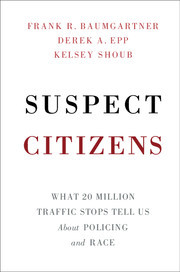Description
Suspect Citizens
What 20 Million Traffic Stops Tell Us About Policing and Race
The costs of racially disparate patterns of police behavior are high, but the crime fighting benefits are low.
Language: English
Suspect Citizens
Publication date: 07-2018
292 p. · 15.8x23.5 cm · Hardback
Publication date: 07-2018
292 p. · 15.8x23.5 cm · Hardback
Suspect Citizens
Publication date: 07-2018
292 p. · 15.2x22.9 cm · Paperback
Publication date: 07-2018
292 p. · 15.2x22.9 cm · Paperback
Description
/li>Contents
/li>Biography
/li>
Suspect Citizens offers the most comprehensive look to date at the most common form of police-citizen interactions, the routine traffic stop. Throughout the war on crime, police agencies have used traffic stops to search drivers suspected of carrying contraband. From the beginning, police agencies made it clear that very large numbers of police stops would have to occur before an officer might interdict a significant drug shipment. Unstated in that calculation was that many Americans would be subjected to police investigations so that a small number of high-level offenders might be found. The key element in this strategy, which kept it hidden from widespread public scrutiny, was that middle-class white Americans were largely exempt from its consequences. Tracking these police practices down to the officer level, Suspect Citizens documents the extreme rarity of drug busts and reveals sustained and troubling disparities in how racial groups are treated.
1. Suspect citizens: fighting the war on crime with traffic stops; 2. A legislative mandate to address concerns about racial profiling; 3. Who gets stopped?; 4. What happens after a stop?; 5. Finding contraband; 6. Search and arrest patterns by officer and agency; 7. Profiling Hispanics, profiling blacks; 8. Black political power and disparities in policing; 9. Reforms that reduce alienation and enhance community safety; 10. Conclusions.
Frank R. Baumgartner holds the Richard J. Richardson Distinguished Professorship at the University of North Carolina, Chapel Hill. He is a leading scholar of public policy and has written extensively on agenda-setting, policy-making, and lobbying. His work on criminal justice includes two previous books on the death penalty.
Derek A. Epp is Assistant Professor of Government at the University of Texas at Austin. In The Structure of Policy Change (forthcoming), he explains how the capacity of governmental institutions to process information affects public policy. He also studies economic inequality with a particular focus on understanding how rising inequality affects government agendas.
Kelsey Shoub is a graduate student in the Department of Government at the University of North Carolina, Chapel Hill. Her research focuses on using publicly available big data to answer questions about what influences policy change, policy outputs, and the context within which they take place.
Derek A. Epp is Assistant Professor of Government at the University of Texas at Austin. In The Structure of Policy Change (forthcoming), he explains how the capacity of governmental institutions to process information affects public policy. He also studies economic inequality with a particular focus on understanding how rising inequality affects government agendas.
Kelsey Shoub is a graduate student in the Department of Government at the University of North Carolina, Chapel Hill. Her research focuses on using publicly available big data to answer questions about what influences policy change, policy outputs, and the context within which they take place.
© 2024 LAVOISIER S.A.S.




